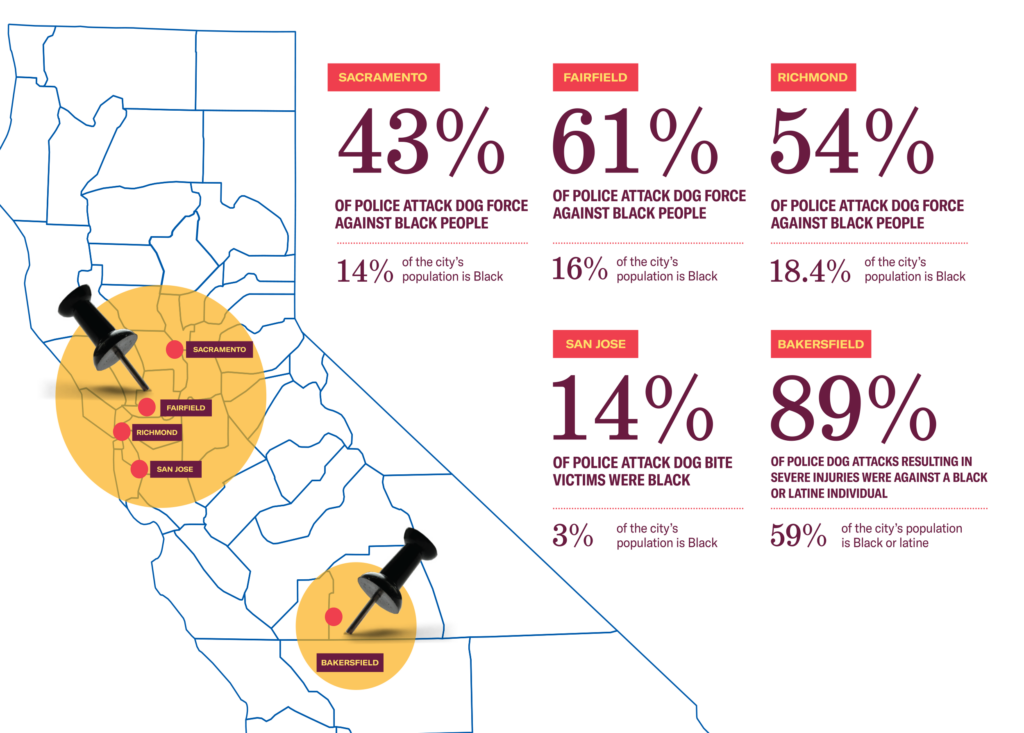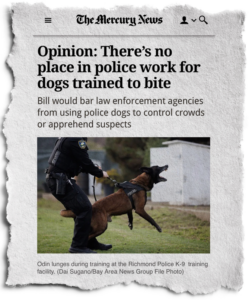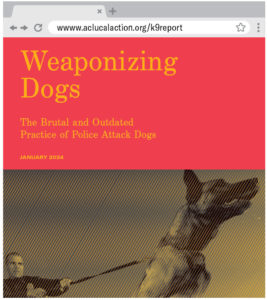NEW REPORT: Weaponizing Dogs – The Brutal and Outdated Practice of Police Attack Dogs
Today, ACLU California Action released a new, first-of-its-kind report examining the outdated and dangerous police practice of using attack dogs to bite and maim members of the public.
Based on our analysis of official data, policies, and public records obtained from 37 police agencies across California, the report details:
- How police are using attack dogs to inflict serious injuries on people who do not pose a danger to officers or others;
- How police are using attack dogs to bite and threaten people experiencing a behavioral health crisis;
- How police use attack dogs to perpetrate racialized violence;
- How police cannot adequately control their attack dogs, who regularly maul bystanders and fail to stop attacking when recalled; and
- How state law and police policies fail to provide accountability when individuals are harmed by their indiscriminate and unnecessary use.
In just the last few years, police have used attack dogs to injure hundreds of people across California so badly that these individuals faced a significant risk of death or permanent impairment of a body part.
[Police dogs] often bite without releasing, even after repeated orders to do so, and sometimes bite the wrong person. Their handlers, he said, often cannot manage them. . . .“These dogs are already genetically programmed for aggression, and then they put them through attack training . . . They can’t be controlled.”
Weaponizing Dogs: The Brutal and Outdated Practice of Police Attack Dogs
Moreover, public records demonstrate a disturbing pattern of racialized violence of police attack dogs across California.

- In Sacramento, police directed 43% of police attack dog force against Black people, who make up only 14% of the city’s population;
- In San Jose, 14% of police attack dog bite victims were Black, though Black residents are 3% of the city’s population;
- In Richmond, over a five-year period, over 54% of people bitten by police attack dogs were Black, in a city that is 18.4% Black;
- In Fairfield, in the same time period, over 61% of people bitten by police attack dogs were Black, in a city whose population is 16% Black;
- Similarly, in Bakersfield, in 2020, 89% of police dog attacks resulting in severe injuries were against a Black or Latine individual, though Black and Latine residents collectively make up 59% of the city’s population; and
- Bakersfield Police Department’s use of police attack dogs is clustered in its communities that are predominantly Black and Latine.
Physicians for Human Rights (PHR) released a companion expert medical opinion this week, which underscores the physical and psychological harms of police attack dogs.
In their medical opinion, PHR details the severe and varied health impacts of police attack dogs. The reviewed cases show harms such as severe pain from deep wounds requiring surgical repair; infectious complications; traumatic brain injuries; permanent disfigurement; blood vessel damage; loss of mobility or bodily functions; cognitive impairment; and mental health consequences, including post-traumatic stress disorder. Expenses for medical care following police dog bites were often exorbitant, requiring costly specialists, surgical procedures, hospitalizations, multiple medications, and frequent medical visits for ongoing medical issues.

While law and police agency policy recognize weapons like batons or tasers as serious instruments of force, more Californians suffered life-threatening or life-altering injuries resulting from police dog attacks than those similarly harmed by batons or tasers.
Yet, there is no state law addressing how and when police unleash their dogs to bite and attack.
Given the scale of this problem and the findings in this report, the state of California must act with urgency to protect the public and enact legislation addressing police agencies’ use of attack dogs. Passing legislation would be a first step in curtailing the brutal and inhumane practice.
With this legislation, we have the opportunity to create a mechanism to protect our communities from vicious harm and hold police accountable for the vicious use of attack dogs.
Issues: Criminal Justice & Policing · Racial and Economic Justice
